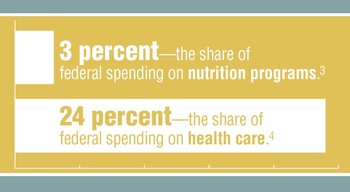Hunger and food insecurity are so widespread in the United States they add $160 billion to national health care spending, according to a Christian advocacy group.
The Rev. David Beckmann, president of Bread for the World, said on Monday (Nov. 23) that hunger was a key factor in the U.S. having the worst infant mortality rate among developed countries.
“It is like a massive terrorist attack,” he said at the presentation of the group’s annual [2016] Hunger Report. “All the things that we do that allow the infant mortality rate to be so high — that is in effect killing a hundred thousand babies in communities across this country a year.”
The report, titled “The Nourishing Effect: Ending Hunger, Improving Health, Reducing Inequality,” notes that the U.S. also ranks at or near the bottom for other indicators such as obesity, lack of access to food and maternal mortality.
“The connection between nutritious food and health seems obvious to all of us, especially Presbyterians who are teachers, run pre-schools, and work with children,” says Ruth Farrell, coordinator for the Presbyterian Church (U.S.A.) Hunger Program. “This Report offers documented socioeconomic inequalities that can help our congregations’ hunger and mission programs do more effective work. I hope that all Mission Committees are able to read the downloaded report as we together to ensure that all of God’s people have access healthy food."
The report says that as many as 50 million people — approximately 1 in 6 Americans — live in a state of sustained hunger or food insecurity, defined as not having adequate access to food to keep them healthy. It says the figure has remained “stubbornly high” at the same level since 2008, despite the recovering economy.
John T. Cook, an associate professor of pediatrics at Boston University School of Medicine, who helped prepare the report, said the figure of $160 billion in health care costs is “probably an underestimate.”
But doctors are increasingly recognizing the connection between health and hunger, experts said.
Acacia Bamberg Salatti of the Center for Faith-based and Neighborhood Partnerships at the U.S. Department of Health and Human Services said hospitals are partnering with church groups to help patients translate their doctor’s instructions and connect them to healthy meals.
“At the end of the day, health care and hunger are very much linked,” she said. “You can’t be healthy, you can’t be able to stave off chronic diseases if you’re not eating healthy food.”
Dr. Sarah Jane Schwarzenberg of the American Academy of Pediatrics said there should be as much attention given to the economic and human costs of food insecurity as to a comparable breakout in infectious disease.
“I think the fact that we can’t see it makes it very hard for people to deal with it,” she said.

